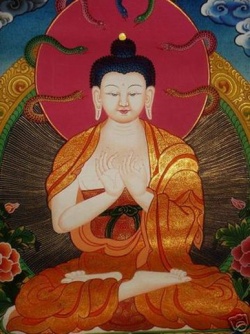Bad Karma
In the Tricycle office this morning we discussed karma and rebirth at our morning meeting and how, while opinions vary widely on the subjects, the concept is freely used and often with little understanding. Most of all karma (which literally means "action") is thought to be responsible for fortune and misfortune in our lives, an attitude that is no different than calling natural disasters "divine punishment." (We heard this from the governor of Tokyo about the tsunami, and also heard that 4 in 10 Americans believe natural disasters are signs from God.)
But in the Tittha Sutta, the Buddha explicitly rejects the idea that our good and bad circumstances are the result of past actions:
"Having approached the priests & contemplatives who hold that... 'Whatever a person experiences... is all caused by what was done in the past,' I said to them: 'Is it true that you hold that... "Whatever a person experiences... is all caused by what was done in the past?"' Thus asked by me, they admitted, 'Yes.' Then I said to them, 'Then in that case, a person is a killer of living beings because of what was done in the past. A person is a thief... unchaste... a liar... a divisive speaker... a harsh speaker... an idle chatterer... greedy... malicious... a holder of wrong views because of what was done in the past.' When one falls back on what was done in the past as being essential, monks, there is no desire, no effort [at the thought), 'This should be done. This shouldn't be done.' When one can't pin down as a truth or reality what should & shouldn't be done, one dwells bewildered & unprotected. One cannot righteously refer to oneself as a contemplative. This was my first righteous refutation of those priests & contemplatives who hold to such teachings, such views. ("Tittha Sutta: Sectarians" (AN 3.61), translated from the Pali by Thanissaro Bhikkhu)
As Nagapriya points out in Exploring Karma & Rebirth, holding to the view criticized here by the Buddha denies not only free will but also the possibility of bettering ourselves in this lifetime. There are numerous example of the Buddha discussing karma in the Buddhist canon that point to alternative readings: In other words, some passages suggest that everything that happens in our lives is a consequence of past karma. Nagapriya attributes this to the multiplicity of sources in the early tradition, and the continuing evolution of ideas both in and around the Buddhist tradition in the fertile intellectual climate of Axial Age India.
As Richard Gombrich and others point out, karma was conceived of as a kind of dust or impurity that clung to souls by the Jains, and was connected with the performance of ritual in the brahminical tradition. The Buddha reversed this: Karma is not something to be cleansed of or that we must live under the yoke of, karma is intention.
Thanisaro Bhikkhu in his recent visit ot the offices suggested we run a special section on all the various views of karma within Buddhism. There's certainly enough to make rich reading.
